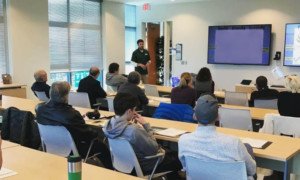 Learning to become more independent is one of the best things you can ever do. Being able to think for yourself and being confident enough to go out and explore on your own can be so empowering.
Learning to become more independent is one of the best things you can ever do. Being able to think for yourself and being confident enough to go out and explore on your own can be so empowering.
As children, it’s natural and normal to be dependent on others. You need your parents or guardians to look after you, and it can be difficult to let this dependency go for some people.
Usually, co-dependency in adulthood is viewed as an unhealthy thing. It often occurs because of childhood trauma or neglect but this isn’t always the case.
An adult might also rely on substances to get by, and this is also a form of co-dependency. Eventually, this form of co-dependency will lead to addiction.
However, as you grow into an adult, being independent is essential to living a fulfilled life. When you feel independent, you discover who you truly are, free of other people’s opinions or judgment.
You can do the things that you’ve always wanted to do with the confidence to believe more in yourself and your own abilities. Independence increases your self-esteem and decision-making skills.
If you feel that you are co-dependent on others and you struggle to make your own decisions, you’re not alone. Many adults are in this boat, and there are things that you can do to find your independence.
No matter what your age, it’s never too late to start living independently! Here are four great things that you can do to achieve full independence.
- Use an Alarm or Alert System
For many older adults, the fear of being alone comes from a fear of falling and not being able to get help.
Falling over is one of the biggest fears for many elderly people because it often leads to serious injuries. If they aren’t able to get help immediately, they could be lying on the floor for hours, unable to get back on their feet.
If you are an older adult and you’re unstable on your feet, you might resonate with the fear of falling all too well. Using a medical alert system or a fall alarm can help you to overcome this fear and walk around independently.
Medical alert systems work by activating a loud alarm when pulled (such as when you fall over). You will be able to get help from those nearby immediately when they hear the alarm sounding.
Alarms aren’t just for the elderly. People of all ages can use them to increase their independence. Younger adults may wish to use something known as an attack alarm. If you fear walking outside on your own, using carrying an attack alarm will help you to feel more confident.
Attack alarms work in a similar way to smoke alarms in your house. They emit a loud noise when activated. When somebody tries to approach you in a negative way, you can sound the alarm and scare away the attacker.
2. Learn More About Yourself
It’s almost impossible to be completely independent when you don’t know very much about yourself. Usually, you might force yourself to do the things that other people around you are doing, even if you aren’t sure that you will enjoy these activities.
Similarly, you might not like certain things because your friends or family members dislike them. When you begin to learn more about yourself, you discover what you enjoy and what you dislike, and you start to think about what you want for your own future.
Knowing who you are can influence every decision that you make, and it helps you to gain confidence in your personality and your abilities. You learn how to trust your instincts and listen to your intuition so that you can make your own decisions without influence from others.
Learning more about yourself is sometimes more challenging than it sounds. It takes some trial and error to discover what lights your fire.
Schedule some time in your calendar for some self-discovery time each week. Take the time to reflect on your days and find new hobbies or past times to try.
3. Set Boundaries and Learn to Say No
Co-dependency often comes along with a lack of boundaries. If you are unable to say no to certain things, even when you know you should, it might be because you don’t feel confident or independent enough to set boundaries.
When you learn to say no to the things that don’t serve you, you can start to carve out more time for self-growth. You have more availability to find out what to figure out what brings you joy.
Remember that it is okay to say no, and sometimes it’s necessary to embark on your journey to complete independence.
4. Focus On Your Redeeming Qualities
Sometimes, co-dependency stems from insecurities. When you don’t feel good enough, or you worry that your skillset is not strong enough, you can rely on other people who possess these skills. However, it’s likely that you have a wide skill set yourself, even if you don’t realize it.
By taking some time to focus on all of the things that you are good at, you will realize that you don’t need to depend so much on other people. You are an independent person and you can do so many things without the help of other people.
Each morning, write down three things that you love about yourself and three skills that you possess. This is known as a gratitude practice, and it will boost your self-confidence and feelings of self-worth.
Practicing gratitude will highlight your redeeming qualities. You will realize how unique and special you are, and this can be amazing for your self-confidence.
